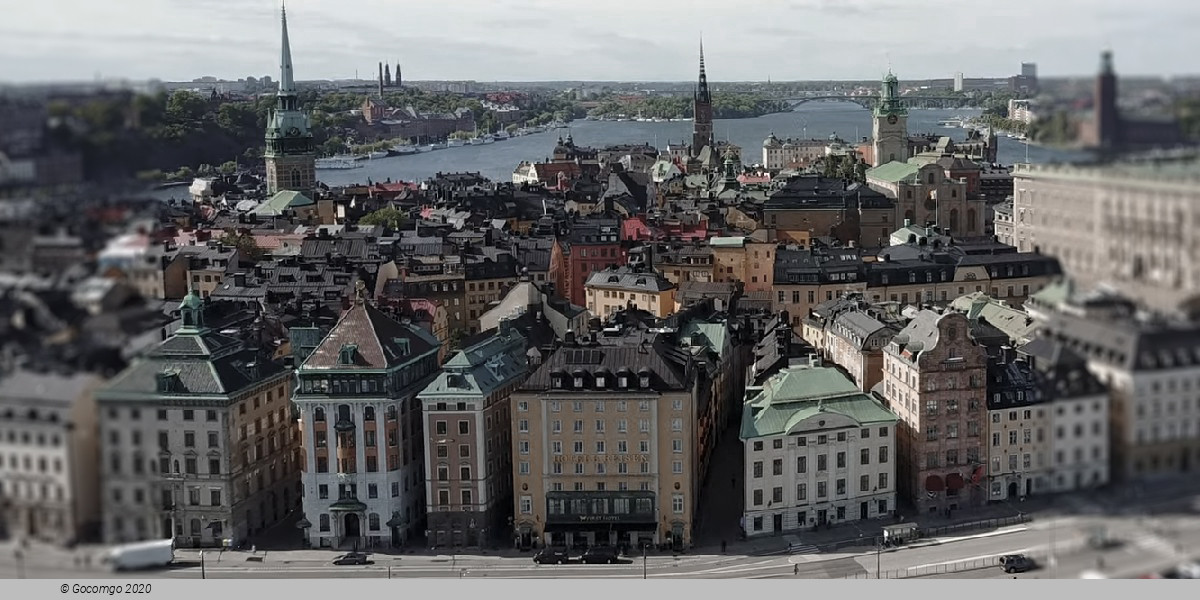Stockholm

Stockholm is the capital and largest city of Sweden as well as the largest urban area in Scandinavia. Stockholm is the cultural, media, political, and economic centre of Sweden. It hosts the annual Nobel Prize ceremonies and banquet at the Stockholm Concert Hall and Stockholm City Hall. One of the city's most prized museums, the Vasa Museum, is the most visited non-art museum in Scandinavia. The Stockholm metro, opened in 1950, is well known for the decor of its stations; it has been called the longest art gallery in the world.Stockholm is the capital and largest city of Sweden as well as the largest urban area in Scandinavia.
Apart from being Sweden's capital, Stockholm houses many national cultural institutions. The Stockholm region is home to three of Sweden's World Heritage Sites – spots judged as invaluable places that belong to all of humanity: The Drottningholm Palace, Skogskyrkogården (The Woodland Cemetery) and Birka. In 1998, Stockholm was named European Capital of Culture.
The city's oldest section is Gamla stan (Old Town), located on the original small islands of the city's earliest settlements and still featuring the medieval street layout. Some notable buildings of Gamla Stan are the large German Church (Tyska kyrkan) and several mansions and palaces: the Riddarhuset (the House of Nobility), the Bonde Palace, the Tessin Palace and the Oxenstierna Palace.
The oldest building in Stockholm is the Riddarholmskyrkan from the late 13th century. After a fire in 1697 when the original medieval castle was destroyed, Stockholm Palace was erected in a baroque style. Storkyrkan Cathedral, the episcopal seat of the Bishop of Stockholm, stands next to the castle. It was founded in the 13th century but is clad in a baroque exterior dating to the 18th century.
Stockholm's architecture (along with Visby, Gotland) provided the inspiration for Japanese anime director Hayao Miyazaki as he sought to evoke an idealized city untouched by World War. His creation called Koriko, draws directly from what Miyazaki felt was Stockholm's sense of well-established architectural unity, vibrancy, independence, and safety.
Stockholm is one of the most crowded museum-cities in the world with around 100 museums, visited by millions of people every year.
The Vasa Museum (Swedish: Vasamuseet) is a maritime museum on Djurgården which displays the only almost fully intact 17th century ship that has ever been salvaged, the 64-gun warship Vasa that sank on her maiden voyage in 1628.
The Nationalmuseum houses the largest collection of art in the country: 16,000 paintings and 30,000 objects of art handicraft. The collection dates back to the days of Gustav Vasa in the 16th century, and has since been expanded with works by artists such as Rembrandt, and Antoine Watteau, as well as constituting a main part of Sweden's art heritage, manifested in the works of Alexander Roslin, Anders Zorn, Johan Tobias Sergel, Carl Larsson, Carl Fredrik Hill and Ernst Josephson.
Moderna Museet (Museum of Modern Art) is Sweden's national museum of modern art. It has works by noted modern artists such as Picasso and Salvador Dalí.
Skansen (in English: the Sconce) is a combined open-air museum and zoo, located on the island of Djurgården. It was founded in 1891 by Artur Hazelius (1833–1901) to show the way of life in the different parts of Sweden before the industrial era.
Stockholm has a vibrant art scene with a number of internationally recognized art centres and commercial galleries. Amongst others, privately sponsored initiatives such as Bonniers Konsthall, Magasin 3, and state-supported institutions such as Tensta Konsthall and Index all show leading international and national artists. In the last few years, a gallery district has emerged around Hudiksvallsgatan where leading galleries such as Andréhn-Schiptjenko, Brändström & Stene have located. Other important commercial galleries include Nordenhake, Milliken Gallery and Galleri Magnus Karlsson.
Distinguished among Stockholm's many theatres are the Royal Dramatic Theatre (Kungliga Dramatiska Teatern), one of Europe's most renowned theatres, and the Royal Swedish Opera, inaugurated in 1773.
Other notable theatres are the Stockholm City Theatre (Stockholms stadsteater), the Peoples Opera (Folkoperan), the Modern Theatre of Dance (Moderna dansteatern), the China Theatre, the Göta Lejon Theatre, the Mosebacke Theatre, and the Oscar Theatre.

